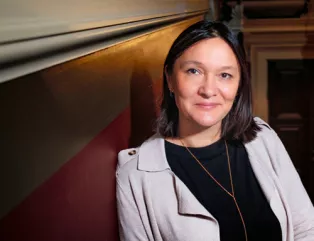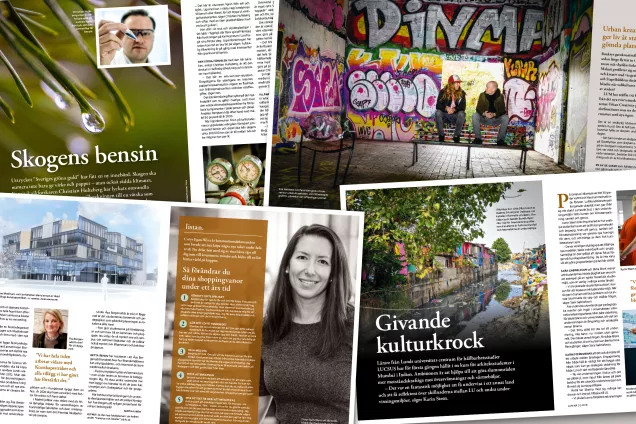Sylvia Schwaag Serger currently works at Vinnova, as the director in charge of international strategy. She has worked there for almost ten years and wants to transfer a part of the culture to Lund University – being open to testing new ideas and experimenting.
“As well as bringing different stakeholders from various fields together”, she says, arguing that interdisciplinary collaborations will become increasingly important in the future.
Sylvia Schwaag Serger has also worked extensively with policy issues relating to education, research, external engagement and internationalisation on a national and international level; not least as a member of the Government’s research committee.
As deputy vice-chancellor, she will be responsible for education and internationalisation issues. She also wants education to become more interdisciplinary. Internationalisation has been an innate part of her being: her mother is Chinese-American, her father German – she herself grew up in the United States and southern Germany, and has also studied in Italy and the UK. To Sylvia Schwaag Serger, internationalisation is not something to be addressed separately; rather, it is to permeate all activities at the University.
She has spent a few of her adult years in China. For two years, on behalf of the Swedish Government, she studied Chinese technology policy, and now she regularly visits the country and teaches Chinese in her spare time. When looking at Lund University from a Chinese perspective, she sees a young generation who think of LU as a dream university, in a country with clean air, good healthcare, education for all and a highly developed democracy.
“The fact that we are a highly-ranked university means a lot to Chinese students!”
Sylvia Schwaag Serger looks forward to learning more about Lund University’s educational issues. She herself received a fantastic university education in the United States, she says, and thinks education in general must be given higher priority. A major and important issue that concerns both of her areas of responsibility as deputy vice-chancellor is how to make it easier for newly arrived immigrants in the education system, and how to become better at assessing qualifications obtained outside academia and Sweden.
“Sweden has surpassed the United States in terms of the proportion of our foreign-born population, and we must relate to and take responsibility for the fact that Sweden is an immigrant country.”
She believes that universities are important in this context, and uses Germany as a good example of a country that takes care of its newly arrived academics. Through individual interviews, an assessment is made of their level of education and the support they need to proceed.
Sylvia Schwaag Serger left the United States when it was time for her public defence. Her thesis in economic history was presented at the London School of Economics, and as a 27-year-old she moved to Sweden. She has lived in Stockholm but mostly in Malmö, and three years ago she, her husband and their two teenage children moved to her husband’s family home in Limhamn. A few years ago, she was one of the hosts on Radio Sweden’s extremely popular summer programme (Sommar i P1), during which she talked about the importance of stepping out of your comfort zone. When asked whether her new position as deputy vice-chancellor constitutes such a step, she takes a few seconds to think about it and then, with a big smile, she says:
“Yes, I definitely think so!”
She says that she enjoys working at Vinnova and that her national and international networks have allowed her to work a lot from her hometown, Malmö. However, when offered the position of deputy vice-chancellor, it was a challenge she could not refuse.
“Comprehensive universities are one of our most important societal institutions, but their role should not be taken for granted in a world that is rapidly changing. We must protect the society we have!”
Sylvia Schwaag Serger has experience in many disciplines: from a German adult education course in hieroglyphs to studying French literature and art history at the undergraduate level, to a Master’s degree in political science.
“My best articles were written together with physicists and engineers”, she says.
Her PhD in economic history was the result of her interest in European integration and the development of economic policy.
Sylvia Schwaag Serger describes herself as pragmatic and she enjoys working with others. She is passionate about being of benefit to society and this gives her a lot of energy. Among her weaknesses she mentions impatience, and she has a hard time accepting negativity.
“I also prefer decisions to be supported by facts rather than feelings”, she says.
Text: Maria Lindh Photo: Håkan Röjder
MORE ABOUT Sylvia Schwaag-Serger
Currently: About to become the new deputy vice-chancellor
Residence: In Limhamn
Family: Husband, two teenage children, mother and many relatives
Interests: Learning Chinese, knitting, growing vegetables (unsuccessfully), playing bridge with her mother
Stays in shape: Running at home in front of the TV watching Chinese documentaries and German crime shows



